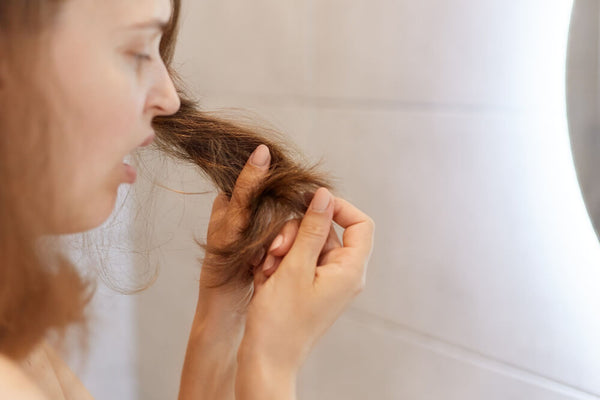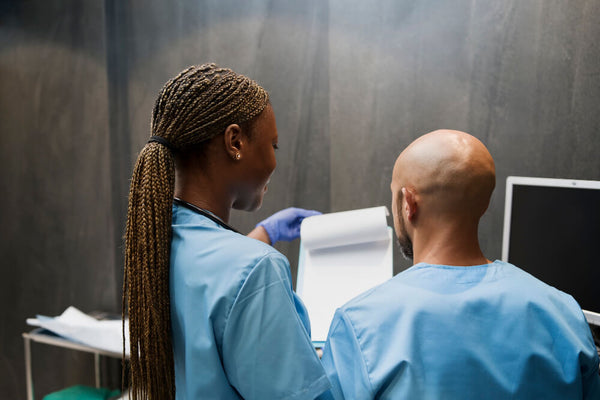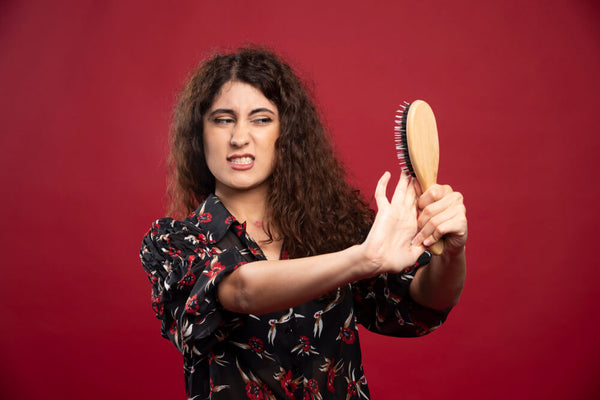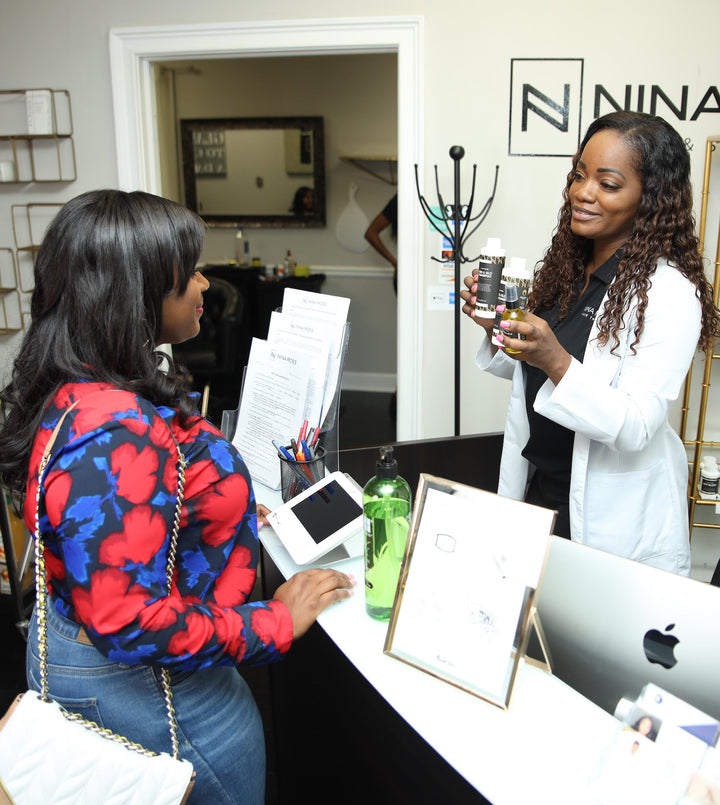There's tired, and then there's anemic tired—that deep bone weariness where even washing your hair feels like running a marathon. And while you're pushing through the fatigue, you're noticing more hair in the drain, your edges looking sparse, your ponytail feeling thinner.
It's not a coincidence. I see this exact story multiple times a week in my Atlanta clinic: Black women who've been told their heavy periods are "normal," who've accepted exhaustion as their baseline, and whose hair is paying the price.
The truth is, if your body is running low on iron, your hair follicles are the first thing it stops feeding. Let's talk about why this hits us so hard and what to actually do about it.
Why Your Body Sacrifices Your Hair First
Think of your iron stores—specifically a protein called ferritin—as your hair's emergency savings account. Your body needs iron to make hemoglobin, which carries oxygen in your blood.
When your iron levels drop, your body goes into survival mode. It starts rationing oxygen, sending it to essential organs like your heart and brain first. Your hair follicles? They're deemed non-essential. The oxygen supply gets cut off, and those follicles basically go into hibernation.
This isn't the gradual thinning of genetic hair loss. This is sudden, noticeable shedding—clumps in the shower, hair all over your clothes, that terrifying feeling that it might not stop.
The 5 Reasons Black Women Are Sitting Ducks for Anemia
1. Our Heavy Periods Get Dismissed
How many of us have been told "heavy flow is normal" or "just take some ibuprofen"? Meanwhile, we're losing significant iron every single month. What's medically considered heavy bleeding (soaking through a tampon/pad every 2 hours) is often brushed off as "just how you're built."
2. We're Not Testing the RIGHT Thing
Your doctor might check your hemoglobin and say "you're not anemic." But here's the secret: hemoglobin is the last thing to drop. Your ferritin stores can be completely drained for months before it shows up on a standard anemia test.
For hair growth, we need your ferritin levels above 70 ng/mL. I can't tell you how many women come to me with "normal" ferritin levels of 15—their doctor said they're fine, but their hair is screaming for help.
3. Our Diets Often Work Against Us
If you're vegetarian or vegan, getting enough bioavailable iron is challenging. Plant-based iron (non-heme iron) is harder for your body to absorb than the iron from animal sources (heme iron). And many traditional Black foods, while delicious, aren't iron powerhouses.
4. Fibroids Are Our Silent Epidemic
Up to 80% of Black women develop fibroids by age 50, and they're a major cause of heavy bleeding. Yet many women suffer for years before getting proper treatment, slowly bleeding their iron stores dry month after month.
5. Inflammation Blocks Absorption
Chronic inflammation—which disproportionately affects Black women due to stress, diet, and autoimmune conditions—can prevent your body from using the iron you do consume, even if you're eating enough.
Why Your Iron Supplements Probably Aren't Working
You might be thinking, "But I already take iron!" Here's why you might not be seeing results:
You're Taking the Wrong Kind: Ferrous sulfate (what most doctors prescribe) is poorly absorbed and destroys your gut. We use gentler, more bioavailable forms like ferrous bisglycinate.
You're Missing the Co-Factors: Iron needs Vitamin C for absorption. Taking it with coffee or tea? The tannins block absorption. Taking it with calcium? That blocks it too.
Your Gut Can't Absorb It: If you have gut inflammation or take certain medications, you might not absorb iron properly no matter how much you swallow.
This is why we created our Nina Ross Iron Protein Plus with Vitamin C and gut-friendly iron—because taking iron that wrecks your stomach or doesn't get absorbed is pointless.

Our Approach: Actually Fixing Anemia, Not Masking It
At Nina Ross Hair Therapy, we don't just throw iron supplements at you and send you on your way. We practice root-cause medicine:
1. We Run the RIGHT Tests: We check your ferritin, not just your hemoglobin. We also test for underlying inflammation that might be blocking iron absorption.
2. We Find the Source of the Bleeding: Are fibroids draining your iron? Are your periods abnormally heavy? We help you get the gynecological care you need to stop the bleeding at the source.
3. We Create a Very Specific Supplement Plan For You: We prescribe the right type and dose of iron that’ll be based on your exact ferritin levels.
4. We Support Regrowth: While we're rebuilding your iron stores, we might use PRP therapy to stimulate those dormant follicles back to life faster. You're not just waiting—you're actively regrowing.
What to Realistically Expect
Hair growth is slow. Once your ferritin levels are optimal (above 70 ng/mL), you might notice decreased shedding in 2-3 months. Visible regrowth? That typically takes 6+ months of consistent optimal levels.
This isn't a quick fix—it's about rebuilding your foundation. But when those baby hairs finally appear at your hairline, every moment of the journey feels worth it.
Tired of Being Tired and Balding?
If you're exhausted in every sense of the word - tired of fatigue, tired of shedding, tired of doctors who don't listen - book your Hair Therapy Evaluation with us for just $99. Let's check your ferritin and finally give your hair the iron it's been begging for.














